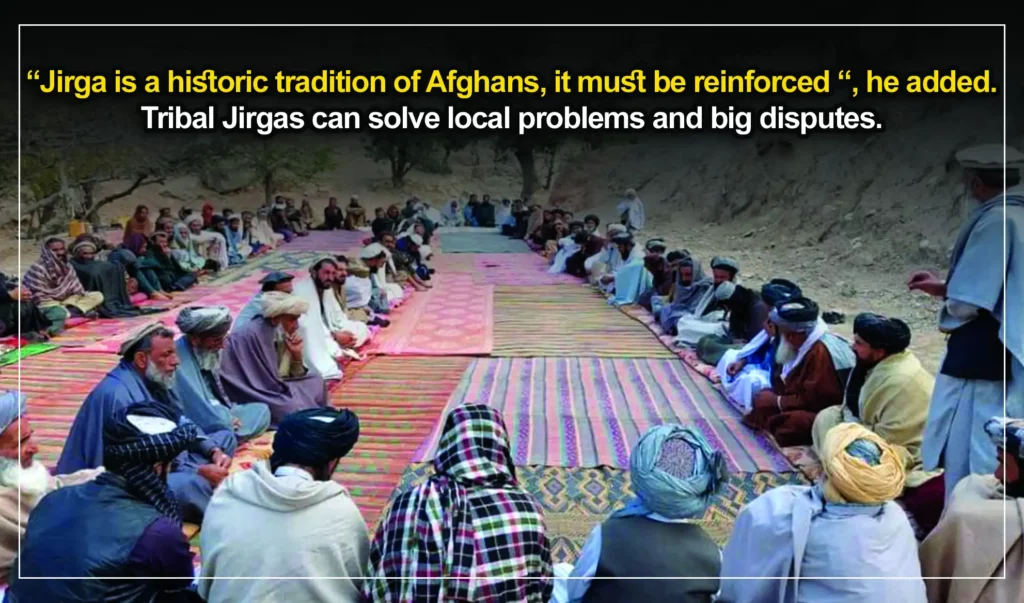KABUL (Pajhwok): If the jirga (tribal council) had not intervened to resolve our dispute, it would have led to a long-term enmity between our families, says Rafiullah, a resident of Kabul city, who had a dispute with his neighbor.
Rafiullah, who lives in Puli Charkhi area, believes the tribal elders’ council is the best way to resolve disputes among people. He is happy that his dispute with his neighbor was solved and they have friendly relations as they had in the past.
“My seven-year-old son was mercilessly beaten by our 18-year-old neighbor about 10 months ago. My son’s skull was fractured and I took him to hospital where he remained admitted for a week. The pain of children is intolerable! When I would look to the wounds of my son, I was about to decide to shift my family elsewhere and kill my neighbor because it was intolerablefor me to face my neighbor in the street,” Rafiullah said.
“During our time in hospital, many tribal elders visited us for solution, it calmed me down”, Rafiullah said.
After his son was discharged from the hospital, the elders visited Rafiullah at his home and mediated about the dispute and changed it to friendship back.
“When someone is angry, he cannot take a wise decision, everything is possible in such situation, if the tribal elders had not mediated, we could have indulged in a lengthy enmity”, Rafiullah said.
“Jirga is a historic tradition of Afghans, it must be reinforced “, he added.
Jirgas have historically played positive role in solution of national, political and other tribal disputes.
Pajhwok Afghan News this year published reports from Nangarhar, Logar and some other provinces where disputes were turned into friendly relations between warring parties with mediation of jirga.
According the reports, jirgas resolved a 40-year-old enmity in Nangarhar and a 35-year-old enmity in Logar provinces.
Tribal Jirgas can solve local problems and big disputes.
Qari Abdul Malik Rashid, a renowned tribal elder, said minor disputes could lead to bigger disputes and tribal wars and solving small disputes meant preventing huge disputes and tribal wars.
“It is the job of tribal elders, religious scholars and influential personalities to keep the jirga tradition alive”, he said.
Mohammad Yaqub Ahmadzai, deputy minister of Borders and Tribal Affairs said jirgas was an accepted norm of disputes solutions in the country. “It is important to generalize this custom more to decrease possible local and tribal disputes”.
“Jirga imposes a fine (Nagha) on both the warring parties in order they do not violate the jirga’s decisions, this fine prevents people from getting involved in disputes and others learn a lesson,” Ahmadzai said.
Other benefit of the council is that it satisfies both sides of the dispute, makes a binding decision and solution, reconciles the disputed sides to hug each other and change their enmity into friendship, according to Ahmadzai.
He said such cases are decided in courts in a long time where one side wins and the other loses, but jirga satisfies both parties to forget their enmity.
To pass on the tradition to next generations, he said, the youth must be encouraged to participate in such jirgas of tribal elders and play their active role in decreasing violence in the society.
All must support the role of jirga to assist the works of the government, the role of jirga must be generalized in society and the government should also refer tribal disputes to the council, Ahmadzai concluded.
Wader Safi, a lawyer said, jirga has a special place in Afghan society and there is no doubt that jirga plays a positive role in dispute resolution.
The government of Islamic Emirate is also trying to refer most of such disputes and issues to jirgas for solution, Safi added.
Pajhwok Afghan News tried but failed to get the opinion of the officials of the Islamic Emirate in this regard.
aw/ma







GET IN TOUCH
NEWSLETTER
SUGGEST A STORY
PAJHWOK MOBILE APP